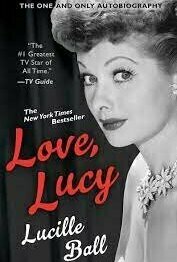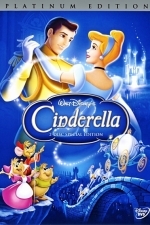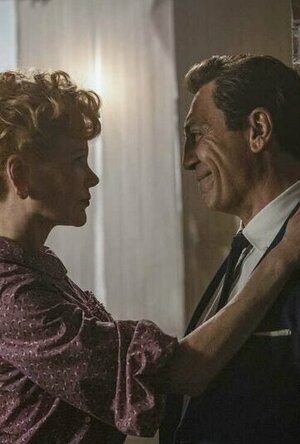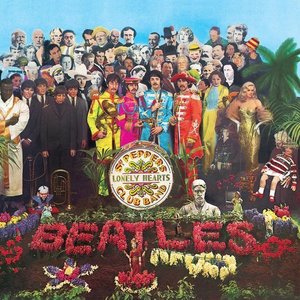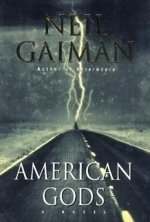Search
Search results
Candace Cameron Bure recommended Love, Lucy in Books (curated)
One of the writers behind I Love Lucy talks about her years on the show and the other shows she wrote for Lucille Ball. It's an interesting look at a historic show and the groundbreaking time for TV in general. Any fan of the show should read it because they'll enjoy it.
Read my full review at <a href="http://carstairsconsiders.blogspot.com/2013/03/book-review-laughing-with-lucy-by.html">Carstairs Considers</a>.
Read my full review at <a href="http://carstairsconsiders.blogspot.com/2013/03/book-review-laughing-with-lucy-by.html">Carstairs Considers</a>.
Matthew Krueger (10051 KP) rated Cinderella (1950) in Movies
Dec 31, 2019
The Glass Slipper
Cinderella- With a wicked stepmother (Eleanor Audley) and two jealous stepsisters (Rhoda Williams, Lucille Bliss) who keep her enslaved and in rags, Cinderella (Ilene Woods) stands no chance of attending the royal ball. When her fairy godmother (Verna Felton) appears and magically transforms her reality into a dream come true, Cinderella enchants the handsome Prince Charming at the ball, but must face the wrath of her enraged stepmother and sisters when the spell wears off at midnight.
Dont you feel bad for Cinderella, i mean i did.
"Bibbidi-Bobbidi-Boo", is my favorite song from this movie.
A classic animation film.
Dont you feel bad for Cinderella, i mean i did.
"Bibbidi-Bobbidi-Boo", is my favorite song from this movie.
A classic animation film.
BankofMarquis (1832 KP) rated BEING THE RICARDOS (2021) in Movies
Jan 14, 2022
Superb "A" plot, Boring "B" plot
When I first heard that Nicole Kidman (of all people) was set to play Lucille Ball in a bio-pic (of sorts), I was suspect over the casting.
Darned if she doesn’t pull it off.
Written and Directed by Aaron Sorkin, BEING THE RICARDOS isn’t, exactly, a bio-pic of Lucy, but rather it tells the tale of a pivotal week in the life of Lucy and her husband Desi Arnaz (Javier Bardem) as Lucy deals with infidelity issues with Desi and accusations of being a Communist from the House UnAmerican activities committee all while trying to put on her weekly TV show. Oh…and it also shows, in flashback, Lucy and Desi’s courtship.
This is a lot to pack-in in one film and this movie almost manages to do it well.
Let’s start with the performances. Kidman is excellent as Lucy - especially as she recreates the Lucille Ball we know on-screen. She has the pattern and physicality of the TV star down and recreates Lucy’s TV personae well. Kidman also digs deeply into her considerable acting talent to pull out the “business” Lucy, showing a determined woman driving her way through a “man’s world”.
JK Simmons is brilliant, as always, as William Frawley (who played Fred Mertz in I LOVE LUCY). Sorkin has written Frawley as the “all knowing” mystic of the piece, hanging into the background, but coming to fore when one of the principal characters needs a bit of sage advice. It’s an old trope, but Simmons pulls it off well.
Unfortunately, the Desi Arnaz and Vivian Vance (who played Ethel) character’s are underwritten by Sorkin. Nina Arianda is well cast as Ethel, but she just doesn’t have much to do (besides being a foil for Lucy - which was what Vance was for many, many years). I’d love to see a version of this film where Arianda is giving something more meaty, I think she’d tear into it.
And then there is Javier Bardem’s portrayal of Desi Arnaz. It is an underwritten part and Bardem plays the surface of this character and just doesn’t get “deep enough” into the soul of this man, so Desi really ended up a throw away character in this.
It was good to see, however, some “veteran” performers (Linda Lavin, Ronny Cox and John Rubenstein) playing older versions of characters involved in the activities in this film, reminiscing (and commenting on) the events. It was a nice framing touch and added some depth to the film.
The praise for the good parts of this film (and there are plenty) and the blame for the bad (boring/underwritten) parts of this film (and there are plenty) all lie at the feet of Writer/Director Sorkin. It is as if he had a really good idea (showing Lucy under pressure by the House Un-American Committee while battling the Corporate Suits - and Directors/Writers/Producers who are not as in touch with Lucy’s Comedy as she is - while trying to put on a weekly show), but it wasn’t quite enough to fill a complete movie, so he added a “B” plot of Desi’s philandering (which is true to what really occurred) and flashbacks to how they met.
The first part works very well (clearly, this was the part that Sorkin was interested in) while the 2nd part feels “put on” (Sorkin “banging it out” to fill the film).
This film is worth watching, I just wish there was more “A” plot and less “B” plot.
Letter Grade: B
7 stars (out of 10) and you can take that to the Bank(ofMarquis)
Darned if she doesn’t pull it off.
Written and Directed by Aaron Sorkin, BEING THE RICARDOS isn’t, exactly, a bio-pic of Lucy, but rather it tells the tale of a pivotal week in the life of Lucy and her husband Desi Arnaz (Javier Bardem) as Lucy deals with infidelity issues with Desi and accusations of being a Communist from the House UnAmerican activities committee all while trying to put on her weekly TV show. Oh…and it also shows, in flashback, Lucy and Desi’s courtship.
This is a lot to pack-in in one film and this movie almost manages to do it well.
Let’s start with the performances. Kidman is excellent as Lucy - especially as she recreates the Lucille Ball we know on-screen. She has the pattern and physicality of the TV star down and recreates Lucy’s TV personae well. Kidman also digs deeply into her considerable acting talent to pull out the “business” Lucy, showing a determined woman driving her way through a “man’s world”.
JK Simmons is brilliant, as always, as William Frawley (who played Fred Mertz in I LOVE LUCY). Sorkin has written Frawley as the “all knowing” mystic of the piece, hanging into the background, but coming to fore when one of the principal characters needs a bit of sage advice. It’s an old trope, but Simmons pulls it off well.
Unfortunately, the Desi Arnaz and Vivian Vance (who played Ethel) character’s are underwritten by Sorkin. Nina Arianda is well cast as Ethel, but she just doesn’t have much to do (besides being a foil for Lucy - which was what Vance was for many, many years). I’d love to see a version of this film where Arianda is giving something more meaty, I think she’d tear into it.
And then there is Javier Bardem’s portrayal of Desi Arnaz. It is an underwritten part and Bardem plays the surface of this character and just doesn’t get “deep enough” into the soul of this man, so Desi really ended up a throw away character in this.
It was good to see, however, some “veteran” performers (Linda Lavin, Ronny Cox and John Rubenstein) playing older versions of characters involved in the activities in this film, reminiscing (and commenting on) the events. It was a nice framing touch and added some depth to the film.
The praise for the good parts of this film (and there are plenty) and the blame for the bad (boring/underwritten) parts of this film (and there are plenty) all lie at the feet of Writer/Director Sorkin. It is as if he had a really good idea (showing Lucy under pressure by the House Un-American Committee while battling the Corporate Suits - and Directors/Writers/Producers who are not as in touch with Lucy’s Comedy as she is - while trying to put on a weekly show), but it wasn’t quite enough to fill a complete movie, so he added a “B” plot of Desi’s philandering (which is true to what really occurred) and flashbacks to how they met.
The first part works very well (clearly, this was the part that Sorkin was interested in) while the 2nd part feels “put on” (Sorkin “banging it out” to fill the film).
This film is worth watching, I just wish there was more “A” plot and less “B” plot.
Letter Grade: B
7 stars (out of 10) and you can take that to the Bank(ofMarquis)
Holly Johnson recommended Sgt. Pepper's Lonely Hearts Club Band by The Beatles in Music (curated)
Rachel King (13 KP) rated American Gods in Books
Feb 11, 2019
I have only ever read one other adult book ( I don't count Coraline) by Gaiman, which was vastly different from this book in both style and mood - Stardust. A friend recommended I read this book many years ago since I like mythology. I found this book really had not much to do with mythology in the classic sense. Instead the characters that were pulled from mythology, such as Odin, Anansi, Horus, Bast, and Ganesha, among others, behaved like has-been D-list celebrities that struggle to survive in a country that is repeatedly described as "...a bad land for gods." The powers they rarely put on display were minimal and amounted to the same kind of "magic" as a skilled pick-pocket, con-artist, or amateur magician. The few times any real power is observed is once during the sexual scene of a re-invented Queen of Sheba (I'll spare you the R-rated details) and when the gods travel "behind the scenes," a state of existence that only the gods can enter.
While the names of classical mythology fit into the category of the Old Gods, there are New Gods that have taken root in America, born from cultural obsessions that have evolved and devolved over the years, such as railroads - a man dressed as a railroad conductor, television - a voice talking through Lucille Ball on a rerun of I Love Lucy, vehicles - stocky men that seemed to resemble vehicles themselves, and internet - a short, nerdy, nervous kid, among other American fixations and stereotypes.
In addition, one of the scenic devices used throughout the plot is what Gaiman's characters describe as places of power - side-of-the-road dives that road-trippers visit for no apparent reason, such as a place boasting the largest doll collection in America or the biggest wheel of cheese. And no, Disneyworld is not one of them.
One of the things I found interesting about this Gaiman-born world is that the Old Gods only exist in the New World when regular people travel from other countries and bring their memories and practices with them, even when they don't intend to stay themselves. The gods are "born" from these average people, and even though they can be killed by others, they don't die otherwise, but instead alternately starve or thrive based on the behavior of the people who live and die in the New World. They all have counterpart manifestations of themselves in the countries they are pulled from, but one's existence does not affect the other - though they do seem to be aware of each other.
All of this is merely the background of the main plot, which centers around the activities and travels of a seemingly mortal man with a single name, Shadow. I never did "get" the one-name thing, but whatever. Through Shadow's narration, the reader learns of an impending storm - a battle between the Old Gods and New Gods, the former fighting for survival and the latter fighting for dominance. Shadow works for a mysterious "Mr. Wednesday" and is randomly haunted by his dead wife, Laura, but otherwise seems to have little drive of his own for most of the book. In fitting irony, he has his own brand of "magic" - an obsession for coin tricks to pass the time from his days spent in prison - which I could never really follow the descriptions of.
To be completely honest, I truly did enjoy this book, though I am struggling to say exactly why. Perhaps I was fascinated by the "shadowy" way that Gaiman told the story, or how he developed this over-the-hill world of gods and goddesses that better resembled America's middle and poor classes' struggles for survival, money, and influence. Some of the personal touches that Shadow's character added to the plot made him at times surprisingly endearing. In addition, the way that Shadow seemed to address the reader at the very end of the book was so satisfying that I laughed out loud and had to read it again several times. Something about that just brought the book to life for me and help me to fully appreciate the versatile style of Gaiman. This is one of those books you don't have to fully understand to fully appreciate.
While the names of classical mythology fit into the category of the Old Gods, there are New Gods that have taken root in America, born from cultural obsessions that have evolved and devolved over the years, such as railroads - a man dressed as a railroad conductor, television - a voice talking through Lucille Ball on a rerun of I Love Lucy, vehicles - stocky men that seemed to resemble vehicles themselves, and internet - a short, nerdy, nervous kid, among other American fixations and stereotypes.
In addition, one of the scenic devices used throughout the plot is what Gaiman's characters describe as places of power - side-of-the-road dives that road-trippers visit for no apparent reason, such as a place boasting the largest doll collection in America or the biggest wheel of cheese. And no, Disneyworld is not one of them.
One of the things I found interesting about this Gaiman-born world is that the Old Gods only exist in the New World when regular people travel from other countries and bring their memories and practices with them, even when they don't intend to stay themselves. The gods are "born" from these average people, and even though they can be killed by others, they don't die otherwise, but instead alternately starve or thrive based on the behavior of the people who live and die in the New World. They all have counterpart manifestations of themselves in the countries they are pulled from, but one's existence does not affect the other - though they do seem to be aware of each other.
All of this is merely the background of the main plot, which centers around the activities and travels of a seemingly mortal man with a single name, Shadow. I never did "get" the one-name thing, but whatever. Through Shadow's narration, the reader learns of an impending storm - a battle between the Old Gods and New Gods, the former fighting for survival and the latter fighting for dominance. Shadow works for a mysterious "Mr. Wednesday" and is randomly haunted by his dead wife, Laura, but otherwise seems to have little drive of his own for most of the book. In fitting irony, he has his own brand of "magic" - an obsession for coin tricks to pass the time from his days spent in prison - which I could never really follow the descriptions of.
To be completely honest, I truly did enjoy this book, though I am struggling to say exactly why. Perhaps I was fascinated by the "shadowy" way that Gaiman told the story, or how he developed this over-the-hill world of gods and goddesses that better resembled America's middle and poor classes' struggles for survival, money, and influence. Some of the personal touches that Shadow's character added to the plot made him at times surprisingly endearing. In addition, the way that Shadow seemed to address the reader at the very end of the book was so satisfying that I laughed out loud and had to read it again several times. Something about that just brought the book to life for me and help me to fully appreciate the versatile style of Gaiman. This is one of those books you don't have to fully understand to fully appreciate.
